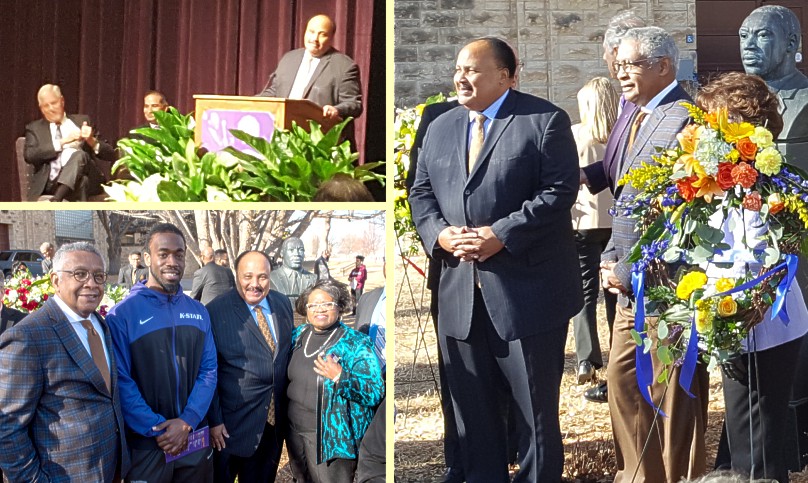Kansas Snapshots by Gloria Freeland - February 2, 2018
"50 years later, progress, or not"
A week ago Thursday, daughter Mariya and I met at the Kansas State University Student Union to attend Martin Luther King
III’s lecture. We could feel the excitement as people greeted friends and colleagues as they entered the auditorium.
Bernard Franklin, K-State’s first African-American student body president and now the assistant vice president for student
life, was instrumental in getting Martin Luther King III to speak at K-State. Franklin’s brother was King’s roommate at
Morehouse College.
King, the eldest son of Martin Luther King, Jr. and Coretta Scott King, was here to commemorate the 50th anniversary of his
father’s Jan. 19, 1968 speech at K-State - one of his last before his assassination less than three months later. It was a
speech that was long thought to be lost. In December of that same year, a fire in Nichols Hall, where the university radio
station was housed, destroyed the tape. But in 2010, a Wichita radio station discovered a tape of King’s 1968 speech.
I wrote a column - “The dreamer speaks again” - about its discovery and playing at a
university convocation. In that speech, King said, “We’ve come a long, long way, but we have a long, long way to go before we
have a truly just society.”
He cited favorable court decisions, including Brown vs. Topeka Board of Education, the 1965 Voting Rights Act and the 1960s
student sit-ins that called attention to the country’s social problems. But he also talked about the crushing poverty and
sub-standard housing experienced by many African Americans.
King’s son, in his speech, "50 years later, progress, or not," also spoke about the gains that have been made since his
father was at K-State, and the work that remains.
“Our father’s life, leadership and legacy were firmly rooted in the values of kindness and tolerance,” he said. King added
that while almost everyone can talk of stories of kindness, tolerance is more challenging. The country was founded by people
escaping religious intolerance, but then those people, in turn, were intolerant toward Native Americans and black slaves.
Referring to President Donald Trump’s recent comments about Haiti, El Salvador and African countries, King said the country
needs to work on the heart of the President. He then quoted his father: “Nothing in all the world is more dangerous than
sincere ignorance and conscientious stupidity.”
King said intolerance is rooted in ignorance, and he suggested we make 2018 a year in which we broaden our relationships to
include other races and cultures.
“This is something we can do without anyone’s permission or authorization ... Let it begin here in Kansas - the heartland of
America. There’s no place like home.”
He also said we should encourage kindness and tolerance among our government officials.
“We need to send the message that we want politicians to build bridges...,” he said.
He noted that progress comes in “fits and starts.” Social reforms take time and people should get involved to help future
generations. For example, the work his parents did paved the way for the election of our first African-American President,
but they didn’t live long enough to see that victory.
The work they did has influenced others, including my friend Susan, a professor emeritus at K-State. She wrote a book on
nonviolence and has taught online classes on the subject. She visited Riverside Church in New York City, where Martin Luther
King, Jr. had spoken against the Vietnam War:
My reason for wanting to be at Riverside Church overlaps with the reasoning behind [the] NVS [nonviolence studies]
program - but nothing direct. Riverside has been a beacon of social justice and broad mindedness, like its first preacher,
a sane Christian named Harry Emerson Fosdick - another old hero of mine. Rockefeller actually built the church for him to
preach in. ... It’s the broad-minded perspectives of Fosdick, King and others that I’ve incorporated into my book and class
and therefore the NVS program.
King, who was only 10 when his father was killed, said some of his favorite memories of his father were traveling with
him, noting, “After he spoke, he had time for everyone.”
It seems he may be following in his father’s footsteps in more ways than one, as evidenced by what friend Pat told me after
his speech:
What an honor to be able to see, hear and then meet Martin L. King III. I felt honored that he took the time to sign
autographs and pose for pictures. What a legacy. During my years of being employed on campus, I was the co-chair and
coordinator of the All University Martin L. King, Jr celebration a couple years. Martin III was gentle and very pleasant in
the delivery of his powerful message. His reflections of his father were heartwarming. When he spoke on the impact of the
Women’s March and his hope for equal pay for women and minorities, I recalled seeing an article recently that Iceland was
making equal pay strides - so we can’t be too far behind. I hope to see this happen in my lifetime. It was also an honor for
my husband, Rev. Sterling Hudgins, to be asked to do the invocation and closing prayer during the w reath - laying Ceremony
at the MLK bust on the KSU campus, after the speech. In the years to come, his name will be noted as part of an important
program in KSU history.
... Serving on the USD 383 Board of Education, there have been victories. I will continue to press on for more.
We all need to press on for more victories for social justice and, in so doing, continue the legacy of the King family
and the multitudes of others who have gone before us.
